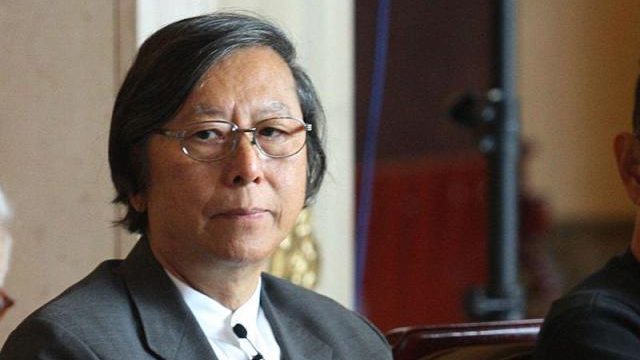
THIS WEEK IN PIANO HISTORY, we remember Taiwanese composer Ma Shui-Long who died on May 2, 2015 at the age of 75. A composer of a wide oeuvre of works, Ma is known for his efforts to blend Eastern and Western compositional traditions.
Ma Shui-Long, born on July 17, 1939, grew up in Ji-long and Jiufen, coastal cities in northern Taiwan. Ma’s family had limited financial resources, and because of this, Ma did not receive formal musical training. Despite this, Ma enjoyed painting and listening to music as a teenager.1 Ma taught himself to play using Ferdinand Beyer’s piano books and studied music theory and harmony from a textbook he found at a bookstore as a teenager.2 Ma entered the National Institute of the Arts in Taiwan where he studied composition with Xiao Erhua. Following the completion of his studies, Ma moved back to Ji-long and began his teaching career, working with students at local schools and helping to organize orchestras and choirs in the area.3
In 1972, Ma received a full scholarship to study at the Regensburg Kirchenmusikschule (Regensburg Music School) and worked with Oskar Sigmund. Following this round of study, Ma returned and began teaching at various institutions throughout Taiwan including Soochow University, Tainan University of Technology, and later, the Taipei National University of the Arts. Throughout his teaching career, Ma maintained significant relationships with musicians and educators in the United States. In 1986, Ma received a Fulbright Scholarship to lecture at Columbia University and the University of Pennsylvania.4 In 2002, Ma’s music was featured at the Lincoln Center in New York City and received rave reviews, leading to performance and lectureship opportunities throughout the United States.5 Ma’s career garnered him several awards including Honorary Doctorates from National Tainan University and the National Taipei University.
Scholar Hsun-Yin Chang describes Ma’s output in three stages.6 Ma’s earliest compositions feature heavy use of Taiwanese folk material and influence of Eastern compositional elements. In his middle period, Ma’s works became more avant-garde, featuring significant dissonance and an improvisational style.7 Ma’s final compositional period includes music that combines both Western and Eastern compositional elements, styles, and materials.8 Ma’s compositional philosophy became a central focus in his teaching as he developed college courses to help students embrace Chinese and Taiwanese musical elements in deep, significant ways.9

Ma’s compositions include a number of important piano works. In 1979, Ma collected Taiwanese and Chinese folk material, documenting over two hundred different melodies.10 In 1980, he arranged these in his 32 Piano Pieces on Taiwanese and Chinese Folk Tunes for Children. The collection, designed for intermediate pianists, presents folk melodies in exciting and popular arrangements. In “The Northwest Rains Pouring Down,” the pianist uses glissandi up and down the keyboard to evoke a intense rainstorm, whereas “The Little Brook” presents interesting broken harmonies, melodic material in the left hand, and arabesques of quintuplets and sextuplets. Listen to recordings below by pianists Meng-Chun Chien and Rick Stanton.
Ma’s works for solo piano include multiple sonatas, the Taiwan Suite (1967), and his Yugang sumiao (A Sketch of the Rainy Harbor, 1969). Yugang sumiao consists of four movements: “Rain,” “Harbor Views on Rainy Nights,” “The Girl who Collects Seashells,” and “At the Temple Gate,” which depict various scenes in his hometown Ji-long.11 The pieces, in addition to evoking Taiwanese folk music, also depict sounds of various Chinese instruments including the zheng, known for its unique glissandi sounds.12 Listen to this recording by pianist Menghua Lin.
Interested in learning more about music by composers from Asia? Read this article below by Lisa Yui titled “Piano Music by Composers from Asia: A History of Self-Discovery.”
OTHER RESOURCE YOU MIGHT ENJOY:
- MAGAZINE ARTICLE: Teaching Contemporary Piano Techniques to Intermediate Piano Students with Alexina Louie’s Star Light, Star Bright by Lynn Worcester Jones
- MAGAZINE ARTICLE: Lessons from Teachers in China by Jerry Wong, Luwen Chen, Chu Fang Huang, Matthew Quick, and Yaokun Yang
- MAGAZINE ARTICLE: What About Piano Study in Australia and the People’s Republic of China? By Scott McBride Smith
- MAGAZINE ARTICLE: Is Teaching Really That Different in Asia? By Scott McBride Smith
- MAGAZINE ARTICLE: Diversifying Concert Programming: Introducing Works for Solo Piano by Asian Female Composers by Amber Yiu-Hsuan Liao
- REPERTOIRE VIDEO SERIES: Nakada: The Sad Waltz by Mengyu Song
- REPERTOIRE VIDEO SERIES: Takemitsu/Hosokawa: Rain Tree Sketch/Etude III: calligraphy, haiku, 1 line by Ikuko Inoguchi
- Use our search feature to discover more!
Sources
- Ting-Yao Huang, “Selected Pieces by Six Taiwanese and Chinese Composers of the Twentieth Century: Ty-Zen Hsiao, Shui-Long Ma, Fan-Ling Su, Kwang-I Yin, Cehn Yi and Tan Dun,” Ph.D. Diss. University of Washington, 2015, 15.
- Hsun-Yin Chang, “A Study of Selected Taiwanese Pedagogical Solo Piano Music of the Twentieth Century,” PhD. Diss. University of Northern Colorado, 2016, 31.
- Ting-Yao Huang, “Selected Pieces by Six Taiwanese and Chinese Composers of the Twentieth Century: Ty-Zen Hsiao, Shui-Long Ma, Fan-Ling Su, Kwang-I Yin, Cehn Yi and Tan Dun,” Ph.D. Diss. University of Washington, 2015, 15.
- Hsun-Yin Chang, “A Study of Selected Taiwanese Pedagogical Solo Piano Music of the Twentieth Century,” PhD. Diss. University of Northern Colorado, 2016, 32.
- Ibid.
- Hsun-Yin Chang, “A Study of Selected Taiwanese Pedagogical Solo Piano Music of the Twentieth Century,” PhD. Diss. University of Northern Colorado, 2016, 53-4.
- Hsun-Yin Chang, “A Study of Selected Taiwanese Pedagogical Solo Piano Music of the Twentieth Century,” PhD. Diss. University of Northern Colorado, 2016, 54.
- Ibid.
- Hsun-Yin Chang, “A Study of Selected Taiwanese Pedagogical Solo Piano Music of the Twentieth Century,” PhD. Diss. University of Northern Colorado, 2016, 54.
- Hsun-Yin Chang, “A Study of Selected Taiwanese Pedagogical Solo Piano Music of the Twentieth Century,” PhD. Diss. University of Northern Colorado, 2016, 128.
- Ting-Yao Huang, “Selected Pieces by Six Taiwanese and Chinese Composers of the Twentieth Century: Ty-Zen Hsiao, Shui-Long Ma, Fan-Ling Su, Kwang-I Yin, Cehn Yi and Tan Dun,” Ph.D. Diss. University of Washington, 2015, 20.
- Ting-Yao Huang, “Selected Pieces by Six Taiwanese and Chinese Composers of the Twentieth Century: Ty-Zen Hsiao, Shui-Long Ma, Fan-Ling Su, Kwang-I Yin, Cehn Yi and Tan Dun,” Ph.D. Diss. University of Washington, 2015, 21.
Mittler, Barbara. “Ma Shuilong.” Grove Music Online. 2001; Accessed 24 Apr. 2023. https://www-oxfordmusiconline-com.uc.idm.oclc.org/grovemusic/view/10.1093/gmo/9781561592630.001.0001/omo-9781561592630-e-0000051529.
Chang, Hsun-Yin. “A Study of Selected Taiwanese Pedagogical Solo Piano Music of the Twentieth Century.” PhD. Diss. University of Northern Colorado, 2016.
Huang, Ting-Yao. “Selected Pieces by Six Taiwanese and Chinese Composers of the Twentieth Century: Ty-Zen Hsiao, Shui-Long Ma, Fan-Ling Su, Kwang-I Yin, Cehn Yi and Tan Dun.” Ph.D. Diss. University of Washington, 2015.